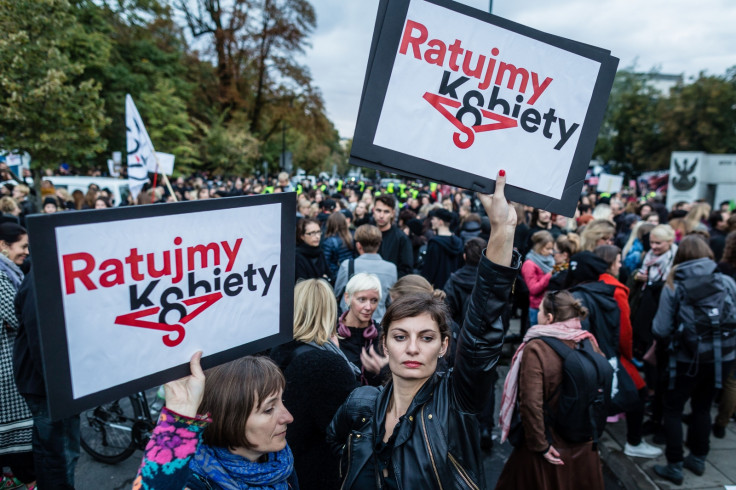Poland's women are on strike over a proposed abortion ban — here's everything you need to know
Women could face up to five years in prison for having a termination under a proposed new law.
Women in Poland are staging an all-out strike over the government's proposal for a total ban on abortion, forcing some Polish businesses to close.
Anti-government, pro-choice demonstrations are also taking place across the country, with many women dressed in black as a sign of mourning for their reproductive rights.
The strike, aimed at bringing Poland's economy to a standstill, is inspired by a mass walkout by Icelandic women in 1975. Women refused to work, cook or look after their children for a day, in a movement that transformed the way women were seen in Iceland and put the country at the forefront of the fight for equality.
Women in other countries are expected to protest in solidarity against the proposed ban on abortion, which would make Poland one of the most restrictive countries in Europe when it comes to access to terminations.
What will the ban the proposed ban entail?
Since 1993, the former Soviet satellite has had one of the most prohibitive abortion laws in Europe. A woman can only have an abortion if the life of the mother or foetus is in danger, in cases of grave foetal defect, or when the pregnancy occurred as a result of rape or incest – and only within the first 12 weeks of pregnancy.
With the support of the Roman Catholic Church in Poland, the ruling conservative Law and Justice Party (Prawo i Sprawiedliwosc, PiS) wants to pass a bill that would only allow a woman to have an abortion if her life was "directly threatened". The ban was proposed by the Stop Abortion coalition, which introduced the so-called "citizen's initiative" in parliament.
If it passes, women who have an abortion could face up to five years in prison. Doctors who assist with terminations could also be liable for prosecution and prison. Human rights groups have warned a woman who suffers a miscarriage could risk being charged on suspicion of abortion.

Critics have warned the proposed law would create a two-tier system of access to terminations, in which only the wealthy can travel abroad for an abortion. This is already the case in Ireland, where abortion is only legal if a pregnant woman's life is at risk. Without the funds to travel, poorer women or underage girls who are unable to travel are forced to have unwanted children or seek dangerous alternatives.
How many abortions take place in Poland?
The current law has not stopped women in Poland from seeking abortions and between 1,000 and 2,000 legal terminations take place each year. Women's rights groups estimate up to 150,000 women have illegal terminations or seek abortions abroad, in countries including Germany, the Czech Republic and Slovakia.
What is public opinion?
According to a survey carried out in May by CBOS, a state-controlled polling agency, the majority of Poles do not support a total ban on abortion. Some 84% of respondents stated abortion should be permitted if a woman's life is in danger by the pregnancy, with 74% declaring abortion should be allowed if the mother was raped.

Is religion a factor?
Yes. The Law and Justice Party has a close relationship with the Catholic church, which exerts a strong influence over Poland as around 87% of the population declare themselves Catholic. Supporters of the party, many of whom are religious, see PiS as defenders of traditional and nationalistic values.
Surveys have found the number of Polish Catholics is in decline, however. In the decade leading up to 2014, the number attending Sunday mass fell by two million.
What is the history of abortion in Poland?
Under Communist rule, terminations were widely available. Abortion was made legal in 1956 for women experiencing "difficult living conditions", which essentially meant the procedure was available freely by the 1960s. Because of the lack of contraception, however, this meant many women had to rely on abortion as their main method of preventing pregnancy.
After the fall of the iron curtain in Poland, the government banned abortion except in cases where the life of the mother was at risk. The current law was enacted in 1993.
© Copyright IBTimes 2025. All rights reserved.






















